Andy Burnham: Who is the Greater Manchester mayor?
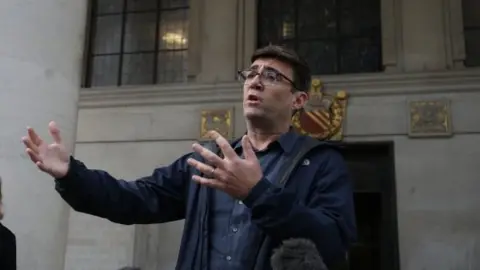 PA Media
PA MediaOnce a New Labour rising star, twice a defeated Labour leadership candidate, now mayor of Greater Manchester.
While other ex-Labour ministers of his generation can be found on the backbenches or the set of Strictly, Andy Burnham has found a new political power base.
His confrontation with the government over coronavirus restrictions has dominated the news over recent days and he has now been dubbed "the King of the North" by one of the city's bars.
Andy Burnham was born in 1970 in Liverpool to telephone engineer Kenneth and receptionist Eileen.
Shortly afterwards, the family moved to Culcheth, a commuter belt village halfway between the city he was born in and the city he now represents as mayor.
The middle of three brothers, he describes his family as "tight-knit", with Everton Football Club being "the glue that keeps us together".
His family on both sides came from Liverpool but he says that growing up he spent more time in Manchester and was "massively into the Manchester music of the mid and late 80s".
He told Nick Robinson's Political Thinking podcast that he did go to the famous Hacienda nightclub, but added: "I probably won't say much more about that,"
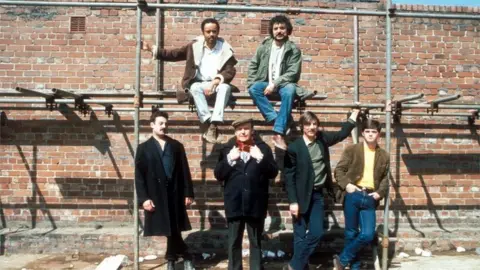
Aged 15 he joined the Labour Party, having partly been politicised by the miners' strikes of 1984-5, as well as the TV series Boys from the Blackstuff - a drama about unemployed men in Liverpool.
He attended a Roman Catholic comprehensive and later studied English at Cambridge University.
After graduating he wrote for trade magazines including Tank World, before getting work with then-Labour MP Tessa Jowell.
In 2001 he was elected to what was then considered to be the safe Labour seat of Leigh in Greater Manchester (it turned Conservative in the last election).
In his first speech to the House of Commons, Mr Burnham told MPs that his constituents had little confidence in Parliament and said his challenge was "to restore people's faith in politics and show that Parliament does listen and deliver good news as well as bad".
Five years after becoming an MP he was promoted by Tony Blair to the position of junior Home Office minister - a role which including going on a "charm offensive" tour to promote ID cards.
In 2008, Gordon Brown made him culture secretary, and it was as culture secretary that he attended a memorial service for the 96 Liverpool football fans killed in the Hillsborough disaster.
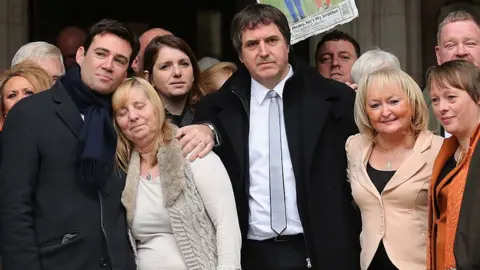 Getty Images
Getty ImagesHe later said he had "agonised for weeks" over whether he should attend the event because he knew "he had nothing to say" to the relatives seeking justice.
His speech was interrupted by heckles from the crowd - angry that no-one had been prosecuted for the tragedy.
This prompted him to raise the issue at cabinet and the Hillsborough Independent Panel was later established to investigate the disaster.
Speaking at an event marking the 25th anniversary of the tragedy, he told the audience that the barracking he had received helped him "find the political courage to do something".
'Punished for loyalty'
In June 2009 he became health secretary and critics have accused him of increasing the role of private companies in the NHS.
However, he argues, he used his time at the Department of Health to change policy by ensuring the NHS was always the preferred provider.
Following Labour's defeat in the 2010 general election, Mr Burnham joined the race to succeed Mr Brown as party leader but lost out to Ed Miliband, coming fourth out of five candidates.
He did better in 2015, coming second, beaten by Jeremy Corbyn.
Reflecting on his defeat, he says he felt he was "punished for loyalty" to the Labour leadership, adding: "Politics doesn't reward people who try and pull for the team."
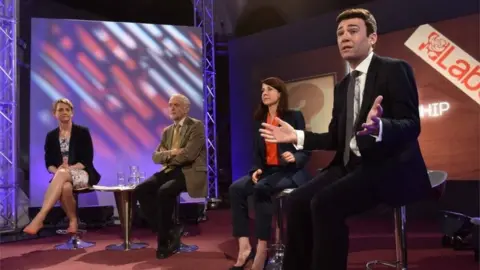
He has previously described himself as "tribal". "If anything defines me, it is being Labour," he has said. "Whoever is the manager, I am part of the team."
However, more recently he told the New Statesman he felt "semi-detached" from the party.
Some have accused him of moving with the prevailing wind and shifting from being a firm supporter of New Labour and Tony Blair when he first started out in politics to posing as the candidate of the left in the 2015 election.
He says he gets "frustrated" by the flip-flop label, arguing that his politics are "nuanced".
Looking back on New Labour, he says "the early albums were very good", but suggests it went wrong when "it courted power and influence too much".
He served in Jeremy Corbyn's shadow cabinet, but stepped down to run for the mayoralty of Greater Manchester - a position he won in 2017 with 63% of the vote.
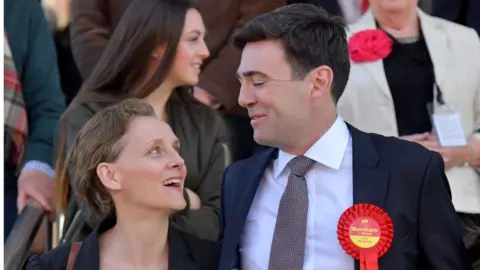 Getty Images
Getty ImagesAs mayor, he promised to donate 15% of his salary - currently £110,000 - to a mayor's homelessness fund and pledged to end rough sleeping by 2020.
Last year he acknowledged that he may not meet the target but said he "couldn't have done more".
He has vociferously defended devolution in England arguing that in the past "places have felt powerless in the face of change."
'The Downing Street ship has sailed'
Mr Burnham says that, apart from London, English cities "aren't punching their weight", adding: "If we are going to make a success of Brexit, you have to set those cities free - and devolution could do that."
He insists that he is "not about plotting a route back to Westminster" and argues that he has more power now than he did as a cabinet minister.
Asked in 2018 if he would rather score a hattrick for Everton or stand on the steps of Downing Street, he said: "The hattrick for Everton dream has long gone, so has Downing Street - that ship has sailed.
"The dream for me is to play some part in the revival of the North of England."
But, whether he wanted to or not, Mr Burnham has very much returned to the centre of attention in UK politics in recent weeks, as he takes on the government over its plans to raise Covid restrictions on Greater Manchester's 2.8 million people to the highest level.
He is demanding more money - as much as under the soon-to-end furlough scheme - to support those likely to unable to work as a result, including staff in pubs and bookmakers.
Warning Westminster not to "ignore" his region, Mr Burnham said: "If we go into a lockdown where we don't support people who are in the lowest-paid professions we will have a mental health crisis on top of a pandemic."
The stakes for Greater Manchester, and Mr Burnham's legacy, appear huge.
